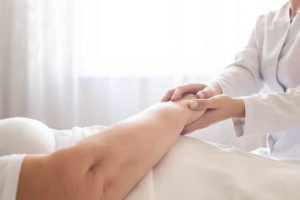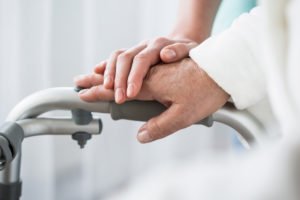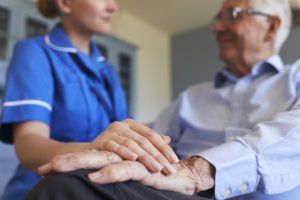
There are four stages of bedsores, with Stage 1 being the mildest, and Stage 4 being the worst condition, which could indicate signs of neglect or abuse. Bedsores — also called pressure ulcers— are areas of damaged skin and underlying tissue caused by staying in one position for a long time, for example, if you are bedridden or paralyzed. It is important to know what the stages of bedsores are, as these ulcers can inform you about the level of care your loved one is or is not receiving as a nursing home resident.
Stage 1
A Stage 1 bedsore is an ulcer that looks different from the surrounding skin. Usually, the skin’s upper layer is the only part affected. At this stage, the skin is not open or cracked, which makes it the mildest form of the condition because the ulcer has not yet broken the surface of the skin.
At this stage, the nursing home staff should continually change the person’s position and provide wound care and regular checks to prevent sores from returning.
Although people with Stage 1 bedsores can recover in a few days, these sores should be identified and treated as soon as possible to lessen the discomfort and prevent the bedsores from spreading and getting worse.
For a free legal consultation, call 800-712-9119
Stage 2
When nursing home staff does not treat a Stage 1 bedsore, it may progress to a Stage 2 bedsore. An ulcer at this stage penetrates the inner layer of the skin and often has fluid or a blister. The sore breaks into the second layer of the skin, but it is easily treated and can heal in a few days with proper care.
The nursing home staff needs to identify a Stage 2 bedsore as soon as possible to avoid complications, such as infections that can spread to the blood, bones, and internal organs.
Stage 3
At this stage, neglect or abuse is already present unless the patient is newly admitted to the facility. When the sore breaks into the second layer of the skin and the fat tissue, it may look like a crater, and it turns black because of dead tissue in the infected skin.
The health care provider must prescribe antibiotics and other supportive treatment to patients with Stage 3 bedsores to fight infection and speed up the healing process.
Click to contact our personal injury lawyers today
Stage 4
This is the most severe kind of bedsore that every nursing home must address. The federal government expects these facilities to prevent and treat bedsores because of their complications. A Stage 4 bedsore usually affects the muscles and ligaments. They can take months to heal or may never heal in people with chronic conditions, according to Medical News Today.
Bedsores commonly form on the skin that covers the body’s bony areas— or those with the least fat and muscles covering them, such as the hips, tailbone, back, and ankles.
Complete a Free Case Evaluation form now
How Can a Person Prevent Bedsores?
Bedsores are skin ulcers that happen when the skin is under pressure from staying in a position for an extended period. When you or a loved one is unable to move, is unconscious, or remains in a wheelchair or a bed, it is essential to inspect the skin for signs of bedsores every day.
Health care providers in nursing homes should be aware of what the stages of bedsores are and have the duty to implement routines and treatment plans to prevent this condition They should pay close attention to bony areas of the body every day and prevent existing sores from worsening. When existing bedsores progress, it is commonly a sign of neglect, malpractice, and abuse, and the senior’s family can take the matter to court.
Are There Laws That Protect Seniors Against Bedsore Injuries?
If a patient has bedsores, the law requires caregivers to provide proper care and treatment to facilitate healing and keep the ulcer from getting worse. In 2017, Congress passed the Elder Abuse Protection and Prosecution Act to prevent bedsores and other injuries and incidents of mistreatment toward older adults. The law also serves to facilitate better data collection on elder abuse.
The United States government has also enacted a Residents’ Bill of Rights to ensure that seniors in nursing care facilities are treated with dignity.
When you leave a loved one in the care of a nursing home, it is essential to know what the stages of bedsores are as well as the signs of elderly abuse and neglect.
If your loved one is suffering from bedsores, get in touch with Ben Crump Law, PLLC, for a free consultation anytime. Call us at 800-959-1444 today to discuss the best option to ensure your loved one will receive continued and appropriate treatment and possible compensation for their injuries, losses, and damages.
Call or text 800-712-9119 or complete a Free Case Evaluation form








